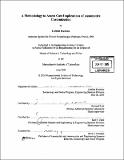A methodology to assess cost implications of automotive customization
Author(s)
Fournier, Laëtitia
DownloadFull printable version (9.241Mb)
Other Contributors
Massachusetts Institute of Technology. Technology and Policy Program.
Advisor
Richard Roth and Joel P. Clark.
Terms of use
Metadata
Show full item recordAbstract
This thesis focuses on determining the cost of customization for different components or groups of components of a car. It offers a methodology to estimate the manufacturing cost of a complex system such as a car. This methodology includes specific consideration of how costs change as customized variants of each component or grouping of parts are included. The central conclusion of the thesis is some recommendations for the automakers when they are facing customization decisions. The automotive industry has reached a mature state, as is evidenced by its growth and by the nature of competition and industry consolidation. Consumers are no longer satisfied with the models that are not individualized and demand a greater variety and individuality. Consequently the automakers are moving towards custom-made cars by customizing the shape and style of components; and this at a certain price. While product variety enables the firm to charge higher prices, automotive customization means also producing at lower production volumes, thereby increasing manufacturing costs and eroding profits. Understanding the cost of customization depends heavily on component cost structures. It is considered that this cost is equal to the difference between the price of a baseline and customized product. A methodology, called Systems Cost Modeling (SCM), is developed in the thesis to build cost structures when estimates for a large number of components have to be considered. After gathering detailed empirical data and considering the eventual changes in the processing conditions of all parts due to customization, the tooling and equipment investment as well as the labor and energy cost are estimated for both the standard and customized car. (cont.) After determining the drivers of the customization cost, a sensitivity analysis is done to understand the variations of this cost under different operating conditions. Finally these results explain that the cost of customization is very sensitive to part and process characteristics.
Description
Thesis (S.M.)--Massachusetts Institute of Technology, Engineering Systems Division, Technology and Policy Program, 2005. Includes bibliographical references (p. 114-115).
Date issued
2005Department
Massachusetts Institute of Technology. Engineering Systems Division; Technology and Policy ProgramPublisher
Massachusetts Institute of Technology
Keywords
Technology and Policy Program.